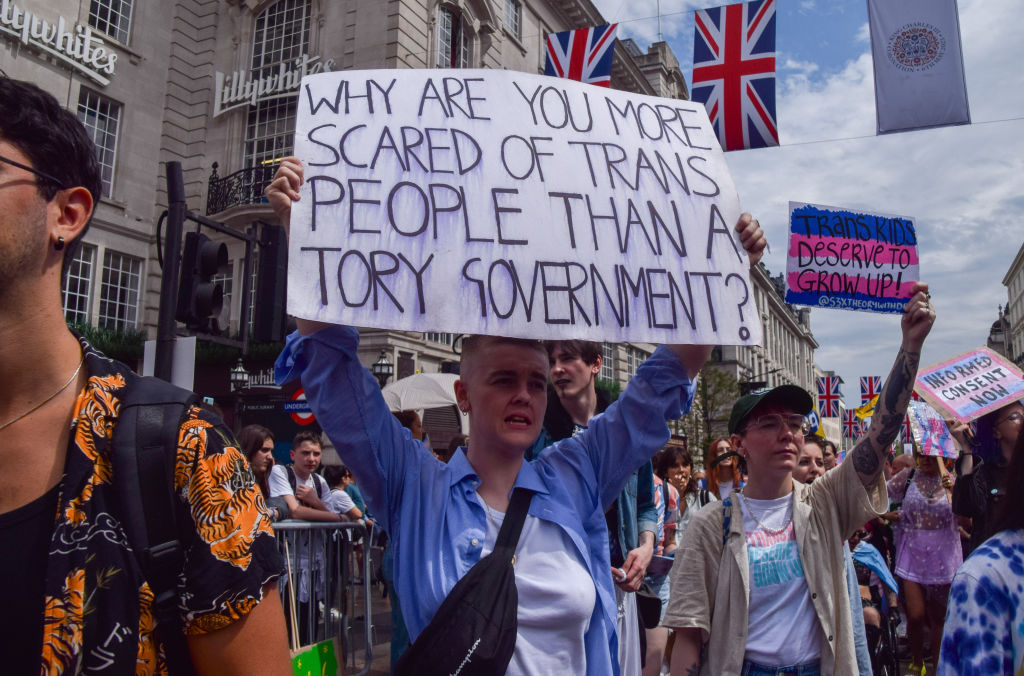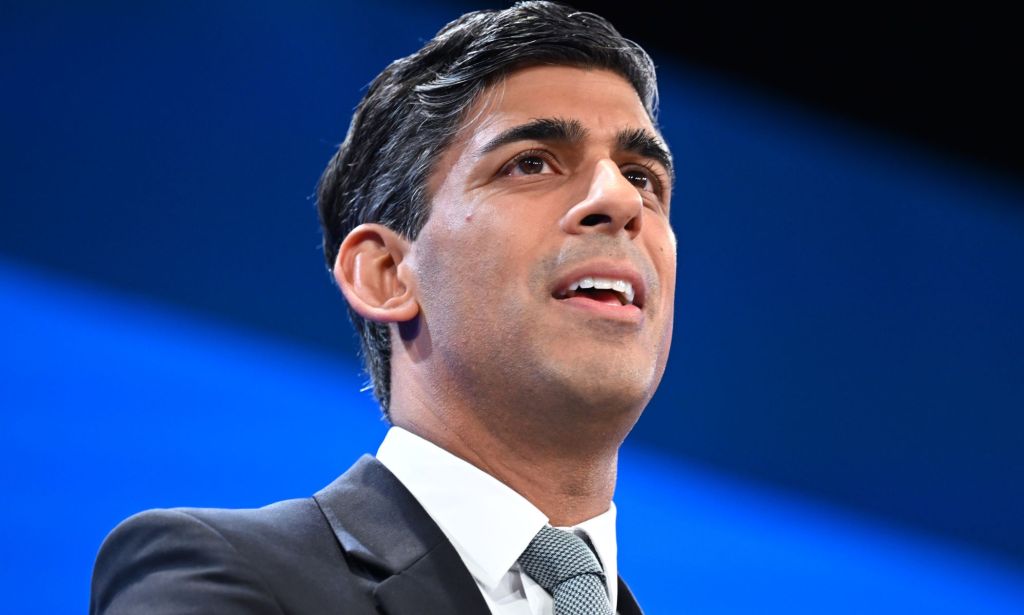LGBT+ Conservatives accused of spreading ‘misinformation’ with puberty blockers podcast

Rishi Sunak signing a pledge with LGBT+ Conservatives. (Getty)
The Conservative Party’s LGBTQ+ group has been accused of spreading “misinformation” about puberty blockers on a podcast.
LGBT+ Conservatives’ podcast Never Kissed a Tory sees members discussing topics such as conversion therapy and homophobia in sport – but in a recent episode, the group turned its attention to gender-affirming care for trans youth.
Chairperson Luke Black and vice-chair for outreach Albie Amankona – both of whom are cis gay men – addressed their “scepticism” about puberty blockers in a conversation about Irish singer-songwriter Róisín Murphy, who recently faced criticism for her comments about gender-affirming care for trans youth.
Black went on to claim that puberty blockers can prevent trans people from being able to achieve a full orgasm in adulthood. He also suggested that such medications, which are sometimes prescribed to gender diverse youth to delay puberty, can stunt genital growth, leaving some with a “micropenis”.
Those people could be “condemned” to live with body dysmorphia for their entire lives, Black argued.
Elsewhere in the podcast, Amankona aired his views on trans women’s participation in sport, saying people have walked away from discussions with him on the topic because he has a “pretty mainstream British opinion” on the subject.

There was also a discussion about the safety of chest binders – which are used by some trans and non-binary people to ease feelings of gender dysphoria – with the hosts discussing whether they might be considered a form of self-harm.
Cleo Madeleine, spokesperson for trans charity Gendered Intelligence, said the podcast risks spreading “misinformation” about puberty blockers.
“I think there would be much more cause for alarm if any other medical service was subject to such a high degree of misinformation, but because this relates to trans people it goes unchallenged,” she told PinkNews.
Madeleine said people shouldn’t look to political podcasts for their information on trans healthcare.
“All we can really do is keep pointing back to the NHS, which says that puberty-delaying treatment and medical transition are safe, and to the peer-reviewed research, which is international and world-standard, which says that timely access to puberty-delaying treatment does enhance and in some cases saves lives.”
She added: “We have to keep reminding ourselves to return to the medical evidence and not to get sucked into these really charged arguments about transgender people and to let healthcare be done by doctors and not by talking heads.”

Madeleine said commentators should “stay out of the debate” and urged them to leave discussions about puberty blockers to trans people and their healthcare professionals.
“Ultimately I’d say that [puberty blockers] are about making sure young people can make the healthiest, happiest decisions for their futures, and it doesn’t help anyone by making these wild and often unevidenced claims.”
Puberty blockers are ‘safe’ and ‘reversible’
A spokesperson for trans youth charity Mermaids echoed that, telling PinkNews that its service users have found puberty blockers to be deeply important in their journey to understanding themselves.
“Puberty blockers are an internationally recognised safe, reversible healthcare option which can prove invaluable for many – particularly when considering the irreversible effects of puberty and the anguish that can, and does, cause trans, non-binary and gender diverse young people.”
On chest binders, Mermaids said they allow “some trans masculine, non-binary and gender diverse people relief from the distress caused by their bodily dysphoria”.
“It’s important that individuals who choose to use a chest-binder do is in line with safety guidelines.”
Alex Charilaou, trans officer with Labour’s student group, said it was “awful” to hear the LGBT+ Conservatives commenting on trans children and trans women in sport on a podcast.
“Instead of challenging their party’s horrible position on these issues, they’re emboldening anti-trans hatred,” Charilaou said. “Real trans allies would leave the Tories, and not put up with this pathetic behaviour from their own LGBT+ wing.”
Responding to the criticism, Amankona said he had “nothing further to add and would refer any interested individuals or organisations to the Cass Review, the high court’s judgment on puberty blockers (and its subsequent appeal), NHS England guidance on trans healthcare and literature like Hannah Barnes’ Time to Think if they wish to understand the positions discussed”.
He added: “It is disappointing but not surprising that some in the LGBT+ community seek to silence evidence led discussion by conservative LGBT+ voices on community matters.”

Puberty blockers have long been a source of controversy among those who oppose gender-affirming care for trans youth.
In 2020, a study published in the medical journal Pediatrics found that trans teenagers’ risk of suicide and mental health problems decreases massively if they have access to puberty blockers.
The study found that such medications can be “life-saving” for trans and gender diverse youth, who are already more likely to face mental health struggles.
In the UK, a small number of young people can be referred to a hormone specialist for puberty blockers if they have “lasting signs of gender dysphoria”.
In June, the NHS changed its policies to restrict access to puberty blockers, claiming more evidence s needed about the potential benefits and harms of such medications.
The NHS’ website notes that puberty blockers are “physically reversible”, but says not enough is known about “what the psychological effects may be”.

